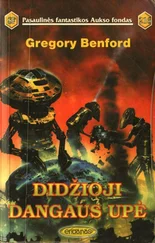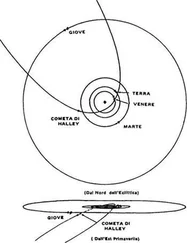The large kitchen was warm and bright. He had put in modern appliances but left the flagged stone floor, worn smooth by centuries of use, and the huge fireplace and the old oak settle. His uncle and aunt sat on either side of the fire in comfortable high-backed wing chairs, as silent and motionless as iron firedogs. In its place at the head of the table, the big round teapot sat under its quilted cosy. Roland, the farmhouse factotum, silently set the plate of scones, pats of sweet butter, and a dish of homemade strawberry jam on the table.
He crossed to the fire to warm his hands. His aunt, seeing him, gave a start.
“Well, bless my soul, it’s Ian!”
She leaned forward and tapped her husband on the knee.
“Henry! Look who’s here. It’s Ian, come to see us. Isn’t that nice?”
“He’s come to live with us, Dot,” his uncle answered patiently.
“Oh?” she said, puzzling. “Oh. Where’s that pretty gel of yours then, Ian? Where’s Angela?”
“Sarah,” he corrected automatically. “She stayed in London.”
“Hmm. Pretty gel but flighty. Well, let’s have tea.” She threw back the rug from her legs.
Roland came forward and lifted her to her seat by the teapot. They all sat round the table. Roland was a big man, slow-moving. He had been with the family two decades.
“Look, Roland, here’s Ian, come to visit.” Peterson sighed. His aunt had been senile for years; only her husband and Roland had any continuity in her mind.
“Ian’s come to live with us,” his uncle repeated.
“Where are the children?” she asked. “They’re late.”
No one reminded her that both sons had drowned in a sailing accident some fifteen years before. They waited patiently for the daily ritual to be completed.
“Well, let’s not wait for them.” She picked up the heavy teapot and began to pour the strong steaming tea into the striped blue and white farmhouse cups.
They ate in silence. Outside, the rain that had threatened all day began to fall, tentatively at first, pattering against the windows, then more steadily. Distantly, the cows, disturbed by the drumming of the rain on the roof of their shed, lowed mournfully.
“It’s raining,” his uncle volunteered.
No one answered. He liked their silence. And when they spoke, their flat East Anglian vowels slid like balm into his ears, slow and soothing. His childhood nurse Had been a Suffolk woman.
He finished his tea and went into the library. He fingered the cut glass decanter, decided against a drink. The steady sound of pouring rain was muted by the heavy oak shutters. They had been well made, concealing a panel of steel, He had turned the place into a fortress. It could withstand a lengthy siege. The cowsheds and barn were double-walled and connected by tunnels to the house. All doors were double, with heavy bolts. Every room was a miniature armory. He stroked a rifle on the library wall. He checked the chamber; oiled and loaded, as he had ordered.
He chose a cigar and dropped into his leather armchair. He picked up a book that lay waiting, a Maugham. He began to read. Roland came in and built a fire. Its rich crackling cut the edge of cold in the room. There would be time later to review the stock of provisions and lay out a dietary plan. No outside water, at least for a while. No more trips into the village. He settled further into the chair, aware that things needed doing, but not for the moment feeling up to it. His limbs were sore and the sudden flashes of weakness still came upon him. Here he was still Peterson of Peters Manor and he let the sense of that sweep through him, bringing a kind of inner rest. Was it Russell who had said that no man is truly comfortable far from the environment of his childhood? There was some truth in that. But the fellow from the village, just how… Peterson frowned. They really couldn’t use the bacon any longer; everything would be blighted with the cloud stuff, at least for a while. The village man probably knew that. And beneath the yes-m’lord manner there had been a clear threat. He had come to barter security, not bacon. Give them some tinned food and all would be well.
Peterson moved in the chair restlessly. All his life he had been in motion, he thought. He had moved up from this landed gentry role, through Cambridge, and into the government. He had used each level and then moved on. Sarah, he supposed, was the most recent clear case, not forgetting the Council itself. They had all helped. The government itself had, of course, followed much the same strategy. Modern economics and the welfare state borrowed heavily on the future.
Now he was in a place he could not leave. He had to depend on those around him. And suddenly he was uncomfortably aware that this small, easily managed band in the manor and village were free agents, too. Once society faltered, what became of the ordering that had kept Peters Manor calm and safe? Peterson sat in the waning light of day and thought, a finger tapping on the arm of his chair. He tried to begin again with his book, but it held no interest for him. Through the window he could see the cut fields that stretched to the horizon. A north wind stirred the crisp outline of the trees. Dusk fell. The fire popped.
CHAPTER FORTY FOUR

NOVEMBER 22, 1963
GORDON WROTE OUT THE EQUATION IN FULL BEFORE commenting on it. The yellow chalk squeaked. “So we see that if we integrate Maxwell’s equations over the volume, the flux—”
Movement at the back of the class caught his eye. He turned. A secretary from the department waved a hand hesitantly at him. “Yes?”
“Dr. Bernstein I hate to interrupt but we’ve just heard on the radio that the President has been shot.” She said it in one long gasp. There was an answering rustle from the class. “I thought… you would want to know,” she finished lamely.
Gordon stood unmoving. Speculations raced through his mind. Then he remembered where he was and firmly put them aside. There was a lecture to finish. “Very well. Thank you.” He studied the upturned faces of the class. “I think, in view of how much more material there is to cover in this semester… Until something more is known, we should go on.”
One of the twins said abruptly, “Where was he?”
The secretary answered meekly, “In Dallas.”
“I hope somebody gets Goldwater, then,” the twin said with sudden vehemence.
“Quiet, quiet,” Gordon said mildly “There is nothing we can do here, right? I propose to continue.”
With that he returned to the equation. He got through most of the introductory discussion of the Poynting vector, ignoring the buzz of whispers at his back. He fell into the rhythm of the discussion. His stabs with the chalk made their clicking points, one by one. The equations unfolded their beauties. He conjured up electromagnetic waves and endowed them with momentum. He spoke of imaginary mathematical boxes brimming with light, their flux kept in precise balance by the unseen power of partial differentials.
Another stirring at the back of the room. Several students were leaving. Gordon put down his chalk. “I suppose you can’t concentrate under the circumstances,” he conceded. “We’ll take it up next time.”
One of the twins got up to leave and said to the other, “Lyndon Johnson. Jesus, we might end up with him.”
Gordon made his way down to his office and put away his lecture notes. He was tired, but he supposed he should go hunt up a TV and watch. The last week had been a madhouse of interviews, challenges by other physicists, and an astonishing amount of attention from the networks. He was thoroughly weary of the whole process.
Читать дальше













